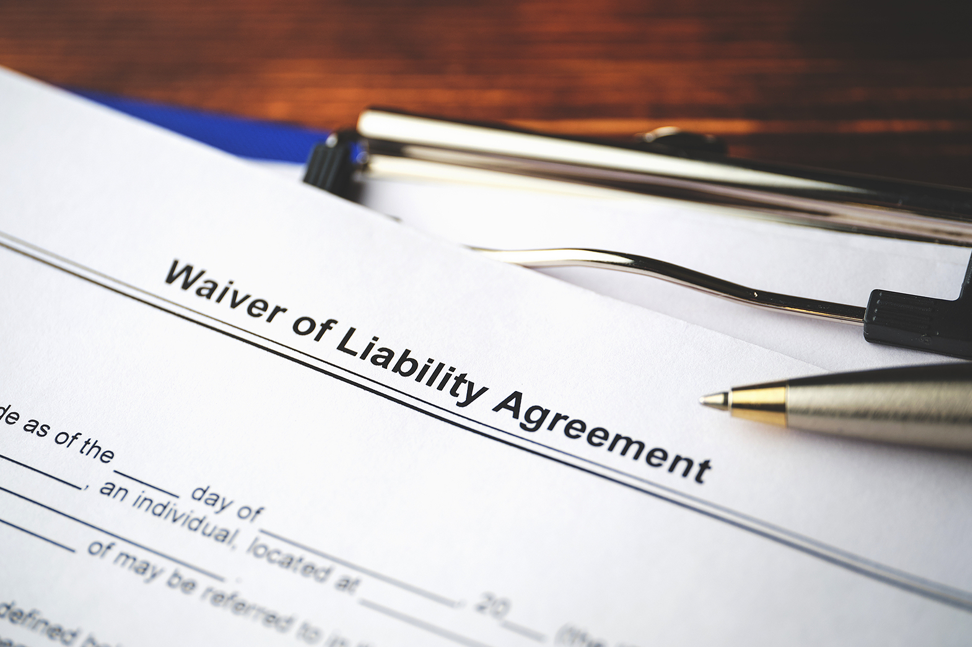In some personal injury cases, you may lose the right to sue another party for harm or damage it has caused. A liability waiver, or release of liability, is a document you may be required to sign to use a facility or participate in an activity. Such activities have inherent dangers despite measures to protect clients. Service providers that know injuries can occur due to unforeseen risks may make your sign a liability waiver form.
What Is a Liability Injury Waiver?
A liability injury waiver is a legal document a company makes you sign to protect itself from being sued if you are injured on its property or while using its services. Many people aren’t familiar with what they are agreeing to. Signees are essentially agreeing not to hold the service provider responsible, including in cases of ordinary negligence.
Ordinary negligence is a term used when, despite a property owner or service provider taking steps to create a safe environment, unsafe conditions exist. Examples include a piece of equipment that suddenly fails or advice that had unintended consequences. This differs from gross negligence, which refers to a party willfully disregarding the safety of a customer, such as not taking action despite being aware of a hazard.
Why Do Companies Make You Sign Them?
A liability waiver has two main purposes. First, it provides a written account that you’ve been warned of potential risks of a specific activity or using a particular service. Second, it frees the company of any injury responsibility that falls under the category of ordinary negligence.
The waiver is legally binding if its language is clear, it’s easily identifiable as an independent document, and lists the injuries the service provider is not responsible for. You enter into this agreement by providing your signature. The document is valid so long as its wording or content doesn’t violate state law or public policy.
Most Common Activities for Liability Waivers
You may be asked to assume the risk of injury to use a service provider’s facilities, participate in a high-risk activity or task, or attend an event in which there are known risks to personal safety. Here’s a more in-depth look into the situations where you might be asked to sign such a contract.
- High-Risk Activities: Such as sky diving, bungee jumping, rock climbing, skiing and snowboarding, animal hunting, or renting an e-scooter, boat, or other vehicles. Gym memberships often require releases to be signed as well.
- Construction Zone: You agree to enter a construction zone in which there are known dangers that carry a high risk of causing injury.
- Contact Sports: Participating in sports that involve body contact, including wrestling, boxing, and other mixed martial arts.
- Handling of Chemicals: An activity that could potentially expose you to toxic chemicals or dangerous compounds such as asbestos.
Can You Sue If You Sign A Waiver?
You could sue and recover damages if the waiver is found to be invalid. Although such a case is often complex, there are a few situations in which a personal injury attorney can find grounds to sue the party. These can include defective product cases. If a court finds evidence of gross negligence, extreme recklessness, or disregard for safety, the company can be held liable even if you signed a liability waiver form.
The waiver can also be invalidated in cases of misrepresentation. If a service or activity has been misrepresented and resulted in your injury, the service provider can be sued for fraud. The court can then not enforce the waiver and possibly rule in your favor.
Contact the Law Offices of Jacob Emrani
If you’ve signed a liability waiver and suffered a personal injury, The Law Offices of Jacob Emrani can help build your case and fight for the compensation you deserve. There may be a chance the waiver you signed doesn’t apply or is unenforceable. Our firm is available if you need a personal injury lawyer near you who provides the highest-quality legal representation. Call 888-952-2952 to schedule your free consultation.



